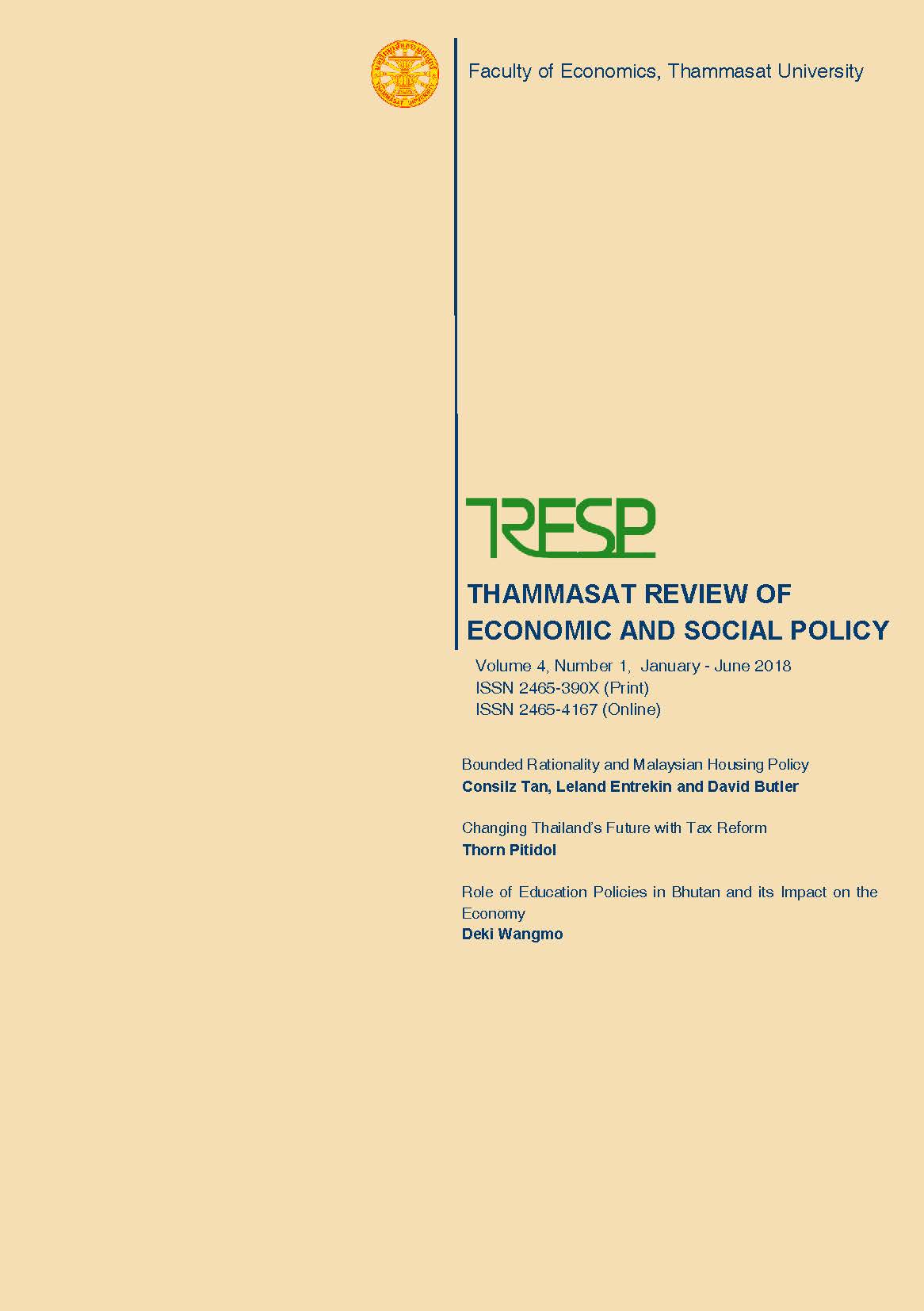Changing Thailand's Future with Tax Reform
DOI:
https://doi.org/10.14456/tresp.2018.2Keywords:
Thailand, Tax Reform, Fiscal Sustainability, InequalityAbstract
At present, Thailand is facing an urgent need for tax reform that can alleviate its long-term fiscal deficit, a condition that is threatening to destabilize the country's economy. The approach that should be taken to solve this problem is to raise tax revenue while simultaneously reducing economic inequality. Policy measures to be taken under this approach include the enlargement of the tax base by registering more people to pay income taxes, the reduction of unnecessary tax benefits, and the expansion of wealth-based taxes. In addition, the government should reform its expenses. In the case that the government chooses to raise tax revenue by a means that does not promote the reduction of inequality, such as raising the VAT rates, the government should make sure that its expenses prioritize improving the welfare of the poor and the disadvantaged. More importantly, for all the changes associated with tax reform to be achieved successfully, fiscal transparency is needed. Fiscal transparency helps inform people how their taxes are being spent, allowing changes associated with tax reform to be understood and accepted. Finally, tax reform also requires a reform of politics and governance. Democratic participation is needed at all levels of government to allow people the opportunity to monitor and help make decisions related to taxation. Decentralization of governance should also be pursued together with fiscal decentralization, in order to equip local governments with more resources and a better ability to respond to the diverse needs of different localities.
References
Achavanuntakul, S. (2016). Tax Reform to Promote Sustainability and Competitiveness: Some Observations. A presentation for meeting on Tax Reform to Promote Sustainability and Competitiveness, Thailand Policy Community on Tax Reform, 18 June 2016, Eastin Grand Hotel, Bangkok.
Ananapibut, P. (2016). Reforming Tax to Redistribute Income and Promote Inequality in Thailand. A presentation for meeting on Tax Reform to Promote Redistribution and Reduction of Inequality, Thailand Policy Community on Tax Reform, 27 Febuary 2016, Banyan Tree Hotel, Bangkok.
Chucherd, T., Angklomkliew, S. & Apaitan, T. (2016). The Perspectives of Debt Dynamic and Fiscal Limit on Fiscal Sustainability in Thailand, (in Thai). Thammasat Economic Journal, 34(1), 57-105.
Credit Suisse. (2017). Global Wealth Databook. Credit Suisse Research Institute.
Kwaja, M.S. & Iyer, I. (2014). Revenue Potential, Tax Space, and Tax Gap. Policy Research Working Paper No.6868. The World Bank.
Laovakul, D. (2016). Reform Tax Through Decentralization. A presentation for meeting on Tax Reform and Decentralization, Thailand Policy Community on Tax Reform, 1 May 2016, Banyan Tree Hotel, Bangkok.
Muthitacharoen, A. (2016). Assessing Tax Incentives for Investment: A Case Study of Thailand. Southeast Asian Journal of Economics, 4(2), 105-128.
Phongpaichit, P. & Baker, C. (2016). Introduction: Inequality and Oligarchy. In Phongpaichit, P. & Baker, C. (Eds). Unequal Thailand: Aspects of Income, Wealth, and Power. NUS Press: Singapore.
Pootrakool, K. (2013). The Quality of Growth from the Perspective of Income Distribution: Problems and Solutions. Paper presented at the Bank of Thailand Annual Seminar 2013.
Siriprapanukul, P. (2016). Tax Structure of Thailand. A presentation for meeting on Tax Reform to Enlarge Revenue, Thailand Policy Community on Tax Reform, 16 July 2016, Eastin Grand Hotel, Bangkok.



